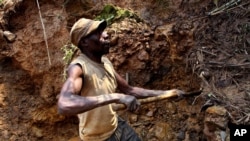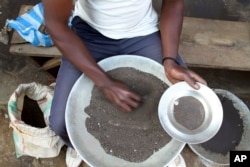Central Africa could see more corruption and violence as a result of a recent decision by a key U.S. regulator to stop enforcing rules requiring companies to avoid the use of conflict minerals in their products, according to some members of the U.S. senate and activists.
Opponents of the change say the rules helped reduce violence in mining areas of of the Democratic Republic of Congo. A provision of the U.S. Dodd-Frank law, section 1502, required companies to verify that their products do not use tantalum, tin, gold, or tungsten that came from operations that benefit armed rebel groups blamed for human rights abuses. These materials are used to make high-tech products, including smart phones, laptops, and tablets.
Some business groups complain that the regulations are burdensome and ineffective in stopping violence.
Democratic senators protest
Acting Chair of the U.S. Securities and Exchange Commission, Michael Piwowar, said in April that the SEC no longer would enforce the rules on conflict minerals. That prompted five Democratic senators to write a joint letter to the SEC criticizing the change. The SEC press office would not comment on the letter or the conflict minerals issue.
Carly Oboth of Global Witness, calls the change a “gift” to armed groups. She says consumers and shareholders have come to expect companies to avoid conduct that makes conflict worse, so firms that do not follow these norms risk damage to their reputation and profit. In a VOA interview, Oboth said Global Witness is an international organization working to break the link between natural resources, conflict and corruption around the world.
Arvind Ganesan of Human Rights Watch told a senate hearing the rule is not a panacea, but is a useful tool to limit continuing “violence and abuses.” He blames the unrest on numerous armed groups including foreign-backed rebels, and the Congolese army that have killed, raped, pillaged, the area and forced children to serve as soldiers as they seek to gain or maintain control of lucrative gold mines. Ganesan also says suspending the rule could put responsible firms that take the trouble and expense to comply with the law at a financial disadvantage.
'Mixed' record
Rick Goss of the Information Technology Industry Council told the same senate subcommittee that the 1502 rules have a “mixed” record in cutting funding to armed groups in the DRC and reducing violence in the DRC.
While the rules have deprived armed groups of revenue from certain illicit funding sources, it is “notoriously hard to determine” the exact impact. He also says the rules have unintentionally hurt employment for some of the very poor people who work in mines. Goss urged the Congress to carefully amend the law rather than scrap it.





